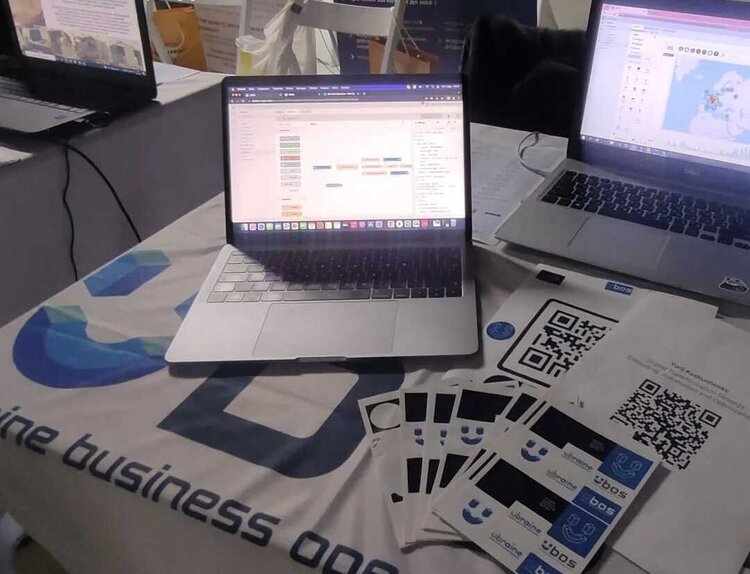A chatbot and UAH 500,000 for the army: How the Ukrainian startup team UBOS helps the military and business
And for what purpose the startup is looking for over $500,000 investment

Mind continues to introduce participants of the Web Summit technology conference with 24 startups representing Ukraine to our readers. Among them was UBOS, a low-code platform that speeds up software development.
How can the platform save time and money on product development? Why does the company teach students low-code methodology for free? And how does it help the army with its solutions? Yuriy Kostiuchenko, UBOS Development Director, told Mind about this and many other things..

Earlier, our outlet told the stories of other summit participants: Releaf Paper, who produce eco-paper from fallen leaves; i3 Engineering, a home energy saving system; MISU, a smart health monitoring solution; and Revisior, a feedback collection service.
On the essence of the project
UBOS is a low-code ecosystem that uses visual programming methods to speed up software development and increase the efficiency of engineers. Yuriy Kostiuchenko explains that engineers can work three to seven times more efficiently depending on the product being developed.
The platform, according to its developers, can save not only time, but also money for development: up to 60% of the total cost of the product budget. To use UBOS, Yuriy Kostyuchenko says, you need to have basic programming skills: to know the basic principles of working with databases and JavaScript.
The team has expertise acquired during 10 years of work on software for various businesses, says Kostiuchenko. It all started with the parent IT company Ubraine, which provides software development services. "Every time we received a new project, it was similar to the previous one we had already done. But we couldn't just copy and paste the code. That's how we came up with the idea of creating UBOS. Our service expertise has moved to a separate product company," our interlocutor adds.
On the work in the wartime and solutions for the army
Since the beginning of the full-scale invasion, the team remained in Lviv. "We have been ready for war since the times of the Covid. We did not feel much stress in terms of business stability," Kostiuchenko said.
During the first weeks of the war, the startup launched two projects on a volunteer basis. Yuriy Kostiuchenko refused to talk about one of them for the safety of the users for whom it was developed.

Another one is a chatbot for a department in the Ministry of Defense to help pass cars at checkpoints faster. Car licence plates are inserted into the bot, then the request goes through two databases: Opendatabot and the internal database of the Territorial Defence. "We knew a person from a territorial defence unit who said that such a bot was needed. We made it literally in two days," our partner adds. Now the startup is ready to help the army with its developments and is open to any offers.
The team started working as early as the beginning of March. In the first week of the war, the company paid all employees their salaries for March, and in early March paid in advance for April. "We did not know what would happen next. We accrued funds so that employees were financially protected," Kostiuchenko adds.
In his words, the startup has donated about UAH 500,000 to the army.
On competitors
According to Kostiuchenko, when the team started developing UBOS, there were up to a hundred similar products. Now there are more than 500 of them, including those by global players: Appian, Pega, etc. The main distinction of the company from its competitors, in his opinion, is solving many customer problems. "Each low-code platform is focused on specific tasks: builder for CRM, builder for websites, builder for mobile applications. We, on our part, do not focus on solving one or two problems. We build an ecosystem: a set of diverse services and tools that the user can integrate into his product. This helps to create software many times faster," explains Yuriy Kostiuchenko.
On clients
The company works with clients from Israel and the USA. UBOS plans to enter the Ukrainian market. "At the beginning of the full-scale war we tried to create something for volunteers for free to facilitate their work. Now we are preparing certain offers for the Ukrainian market. It is interesting for us because of the ease of communication," says Kostiuchenko.
He points out, however, that the startup does not plan to conquer any specific markets or niches, but rather forms offers for companies so that they can develop their own projects based on the UBOS product.
On monetisation
The company follows the usage-based pricing model: the system user pays only for the consumed resources. "This is as fair as possible, because if we provided a fixed price for a month, small systems that consume few resources would pay the same as a large system that consumes more," the interlocutor explains.

The company also launched a platform subscription, which is available for large companies. Businesses receive an individual offer that is formed according to their needs and the number of users. Kostiuchenko adds that now the platform is completely closed, but UBOS plans to switch to the Open Source model.
On investments
More than $200,000 of own funds have been invested in the development of the startup. Now UBOS is open for investments. "We are interested not as much in money as in growth. If there is a foundation, investor or company that is interested in us as a product, and they are ready to cooperate with us on further growth, this option attracts us," Kostiuchenko notes.
He says that in order to catch up with large competitors, the company needs more global marketing and a larger team of engineers. Now the company employs 15 specialists and three mentors-advisors. And for some processes, such as marketing or design, the company invites contractors.
Funds are also needed to cover deposits for cloud resources. "You can choose the cloud to host your application on your own. And therefore, some deposits must be there. We need to have money to cover these costs," Kostiuchenko explains. He adds that they need about $500,000 for this purpose.
Now the team has plans to participate in grant competitions. "This is our startup path. At first we decided that we would 'close' and just make a cool product. But then we began to provide beta users with our platform and receive feedback. We realised that the "fencing-off-to-everybody" strategy is completely unproductive. We need to show more to get feedback from people to improve the product," Kostiuchenko says.
On student training
Last year, UBOS together with the IT STEP University in Lviv launched a training course. The institution sent 13 students to the company, who were taught to work with low-code methodology based on UBOS.
This year, the company invited students for an internship, where they can master the platform. "When we will present customers with our product, they will most likely want someone experienced to work with them on this platform. Since we do not want to do the service ourselves, we are ready to train people so that we can provide a list of our students who can be hired. And we will just provide advice," the interlocutor explained.
On the promising future
Now the company plans to create various interactive training materials for people who are just starting to work with the platform so that they can master the system on their own. "We are building a community around our ecosystem, and, accordingly, developers will communicate with each other on how to do certain things better," Kostiuchenko explains.

The team plans to launch its own academy to teach people how to use the platform. Training will be free of charge, as the company has no commercial purpose in education projects. "When we recruit students, all CVs are similar to each other. During the training, students will learn new skills and create systems. And after that, their CV will include low-code methodology and launched projects," Kostiuchenko clarifies.
The startup also had plans to launch a public cloud platform this autumn. But they postponed it for a year because they want to collect more feedback. "In late 2023 – early 2024, everyone will have the opportunity to enter, register and use the UBOS low-code platform for developing software," our interlocutor concludes.
If you have read this article to the end, we hope that means it was useful for you.
We work to ensure that our journalistic and analytical work is of high quality, and we strive to perform it as competently as possible. This also requires financial independence. Support us for only UAH 196 per month.
Become a Mind subscriber for just USD 5 per month and support the development of independent business journalism!
You can unsubscribe at any time in your LIQPAY account or by sending us an email: [email protected]


